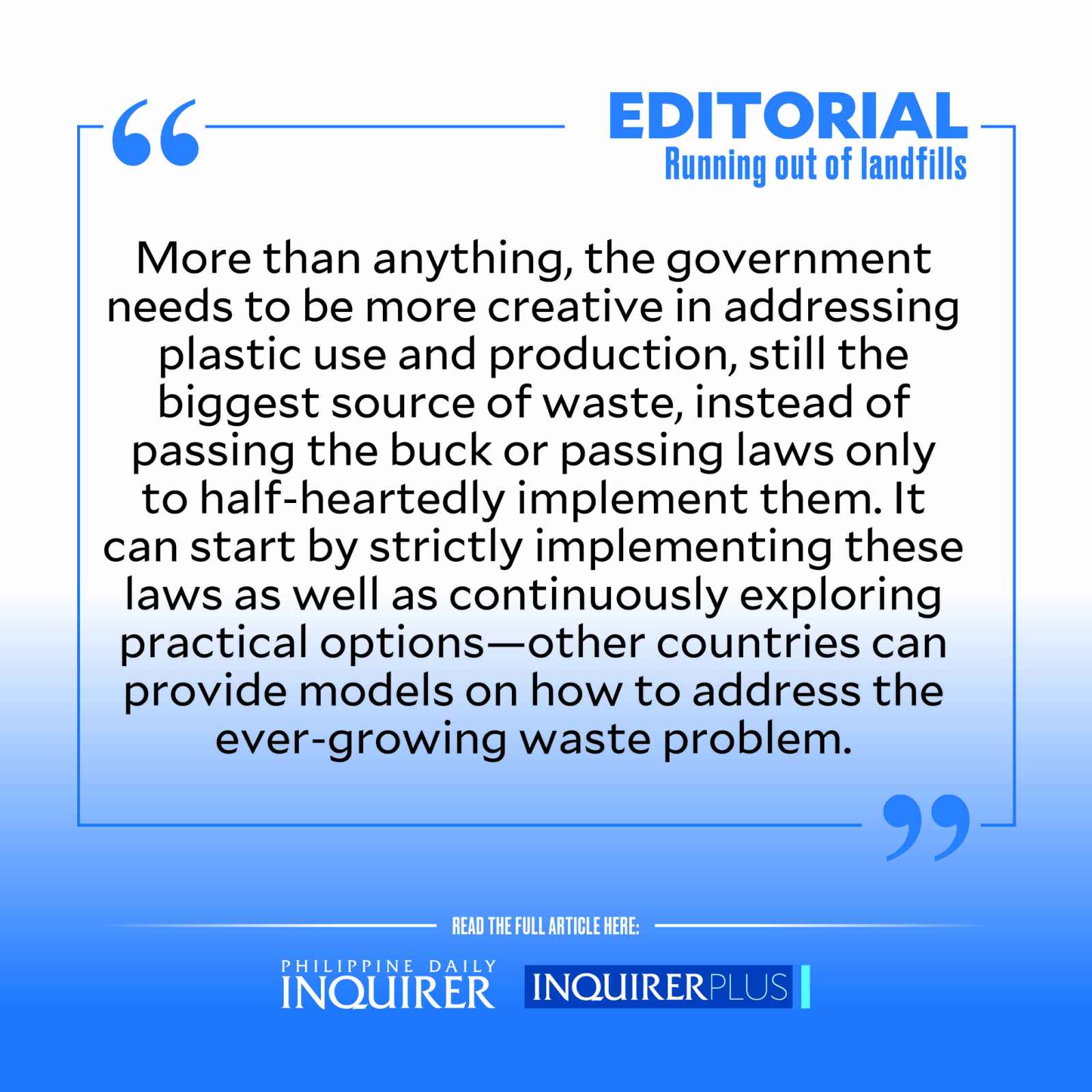Running out of landfills

A recent Commission on Audit (COA) report has warned: available sanitary landfills in the country are fast filling up and only a few new ones have been constructed to meet the increasing amount of waste produced daily. This problem is not unique to the Philippines but is also faced by other countries. Imagine if landfills across the world are filled to capacity—it will be an environmental disaster.
The COA report said, as of 2021, there are 245 operational sanitary landfills. But these are servicing only 478 or 29.25 percent of the country’s 1,634 local government units (LGUs), and are barely enough to receive the 12,091 tons of waste produced per day nationwide, equivalent to almost 600 garbage trucks. Almost three years ago, the Department of Environment and Natural Resources (DENR) targeted the construction of 300 new sanitary landfills but reports stated that only 56 have been built since mainly because of LGUs’ limited resources. What’s worse, it is also getting more expensive to haul trash—in the National Capital Region alone, the Metropolitan Manila Development Authority spent P3.336 billion last year for environment/sanitary services to collect garbage.Solid waste management is a very complicated problem that involves so many stakeholders but it boils down to the unmitigated production and generation of waste, particularly plastic, and exacerbated by poor segregation resulting in landfills filling up with mixed waste at a faster rate. Waste segregation is very crucial because it can help reduce the amount of landfill waste by diverting them to materials recovery facilities (MRFs). But because segregation is not done conscientiously, waste items like food scraps, paper, plastic, or liquid are all mixed up in landfills to decompose and this could be hazardous to human health and the environment due to the run-off that they release into the soil and harmful gas into the atmosphere.
The COA also found that many LGUs have not established solid waste management boards, have not submitted their SWM plans, and have not built MRFs as required under Republic Act No. 9003 or the Ecological Solid Waste Management Act of 2000. LGUs are required to divert at least 25 percent of their localities’ solid waste—meaning to reuse, recycle, compost, and other recovery activities—from the time RA 9003 was adopted in 2001, and to increase this goal every three years thereafter. However, COA said, “[m]ore than 20 years after the passage of RA 9003, solid waste generation in the country has steadily increased from 9.07 million metric tons in 2000 to 16.63 million metric tons in 2020. The situation may be attributed to the frail enforcement and compliance with the law due to political, financial, and technical limitations of the local government units (LGUs) and implementing agencies.”
Aside from RA 9003, the country has more than enough laws to address the waste problem, including RA 11898 or the Extended Producer Responsibility Act of 2022, which obliges companies to take responsibility for the recovery, recycling, or disposal of the plastic that they produce. Regulations are in place, too, such as the DENR’s order to LGUs to establish ordinances instructing barangays to undertake waste segregation at source and to act against those who will not comply. No word yet on what has been done with the noncompliants and it remains to be seen whether all these laws are just lip service.More than anything, the government needs to be more creative in addressing plastic use and production, still the biggest source of waste, instead of passing the buck or passing laws only to half-heartedly implement them. It can start by strictly implementing these laws as well as continuously exploring practical options—other countries can provide models on how to address the ever-growing waste problem. Columbia, for example, has incentivized its recycling initiative through ECOBOT, a reverse vending machine it put up in shopping malls, institutions, and public spaces. Anyone who deposits plastic bottles or caps can get coupons ranging from restaurant or shopping discounts, movie tickets, etc. from the project’s partners; the plastic waste collected is then sent to recycling plants. In Indonesia, people can trade garbage for medical services and medicines through its Garbage Clinical Insurance.
There are many ways to improve solid waste management so that landfills would not face over-capacity just as there are many solutions to reduce the garbage that we produce: decrease the production of plastic waste, encourage the public to recycle, help LGUs fulfill their mandate of segregating waste at the source, build more MRFs, implement the country’s environmental laws—and strictly. If all these come together, we won’t be racing against time to build more landfills to accommodate all the trash that we recklessly generate.





















